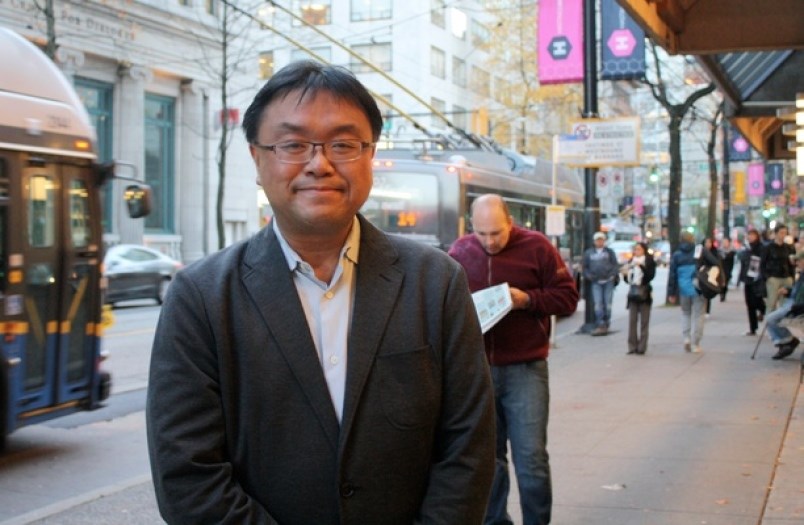There is a Mexican restaurant around the corner from my house in what, I’ve recently discovered, is now called the “Fraserhood.” It’s always packed. Without fail, the line snakes out the door from late afternoon to close, the too-close tables crammed with young hipster couples, families with small kids and singles waiting for takeout. It’s quintessential East Van, right down to the astute observation a recent houseguest made while we were waiting for burritos: “Vancouver’s so white.”
I hear this a lot from visitors, mostly people who, like my guest, have lived here before and moved away. I bristle every time this is noted. It threatens the narrative we, liberal West Coasters, with a strong sense of social justice, tell ourselves about our thriving multicultural metropolis. Census data shows almost half of Metro Vancouverites identify as visible minorities and projections hold that by 2031 those “minorities” will be the majority. And if that weren’t enough, we have largely embraced the language and rituals inherent in living in a diverse, contemporary culture: we open every public event with the acknowledgement that we are on unceded Coast Salish Territory, we wish each other Gung Hay Fat Choi while diving into dim sum, we know to say Happy Norooz, and celebrate Diwali.
We may not be a white city, but we are a segregated one. It’s this that my visitors pick up on. Compared to Toronto, Montreal, even Calgary or Edmonton, walking down the street or dining out in Vancouver yields a snapshot of a population that tends to self-sort along lines of race, culture, language and immigration status. But we are not very good at talking about why this is, about the role our history of overt and rather brutal racism plays in a city that has unusually hard and fast lines between the tiles on its cultural mosaic. Nor are we very good at discussing the more insidious and subtle ways racism plays out still. And we need to if we’re going to get to the heart of another very pressing social issue: our current housing affordability crisis.
With a mounting body of evidence suggesting uncontrolled foreign capital is responsible for our distorted housing market, we need to deal with the baggage triggered by the fact that this capital, in this instance, happens to be coming from China. As researcher Andy Yan and journalist Ian Young — both ethnically Chinese — have repeatedly asserted, this is an issue of wealth, not race. But we have a long way to go in pulling those two topics apart.
Our collective discomfort with even the mere mention of race has been used by political leaders to silence or redirect lines of inquiry that could prove very awkward, and potentially damaging, to those whose political fortunes rely on comfortable relationships with the development and real estate industries. Just look at how quickly Mayor Gregor Robertson’s concerns about “racist undertones” in Yan’s recent study looking into ethnic Chinese ownership of West Point Grey properties effectively shut down any further discussion about the further analysis of the situation that is desperately needed.
At the same time, concerns over racist backlash aren’t unfounded. We are not living in a post-racial society. One example of this is in the salacious media fascination with Vancouver’s Chinese nouveau riche that has garnered an international audience through the New Yorker and the New York Times. The problem with chronicling the antics of “Ultra Rich Asian Girls” or Chinese immigrants shopping for luxury cars is it “creates this wrong correlation between their race and their wealth,” says Jackie Wong, a writer and friend who recently wrote an excellent piece about the impact of this kind of coverage for The Tyee.
In contrast to the kind of “neutral” gawking at opulence we’ve seen before, through everything from Lifestyles of the Rich and Famous to MTV’s Cribs, the overt focus on the Chineseness of this wealth feeds into the kind of dangerous generalizations that stoke anti-Asian sentiment. Wong’s email inbox fills with racist tirades whenever she writes or speaks about the topic. What’s needed to get to the heart of the issue — that we need better data and concrete government intervention in the housing market — is for us to first establish an anti-racist framework in which to discuss the housing issue, says Wong.
“A big part of it needs to start with talking about racism and talking about how we’ve been quite universally complicit in promulgating very problematic racisms in Vancouver,” she says. “I think only after we’ve talked about racism can we talk about foreign capital.”
It’s a tall order, for sure, but I think she’s right. At the moment, our housing conversation is being dominated and derailed by the fear, guilt, shame and anger that’s rolled up in issues of race and racism. Only after we unpack all that can we address the government inaction and short-sighted policies that have created a city that is unliveable for too many people — no matter their language, heritage, or skin colour.
Jessica.Barrett@gmail.com
@jm_barrett



